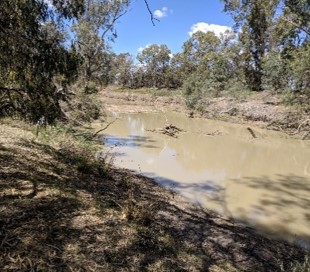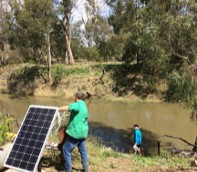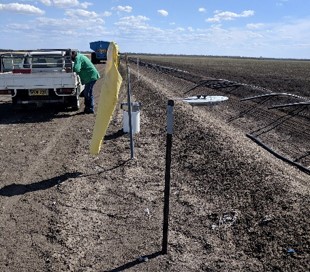
Quantifying the potential risk of pesticides used on cotton farms
 The last two decades have witnessed vast reductions in pesticide use in the Australian cotton industry. Nevertheless, the changing spectrum of active ingredients being used (e.g. a return to more persistent pre-emergent herbicides; new herbicide-tolerant cotton varieties) and management practices (e.g. increased night-time spraying) means that the cotton industry needs to remain vigilant to potential non-target impacts.
The last two decades have witnessed vast reductions in pesticide use in the Australian cotton industry. Nevertheless, the changing spectrum of active ingredients being used (e.g. a return to more persistent pre-emergent herbicides; new herbicide-tolerant cotton varieties) and management practices (e.g. increased night-time spraying) means that the cotton industry needs to remain vigilant to potential non-target impacts.
Objectives
- To identify pollution hot-spots and hot-moments for priority pesticides, and the magnitude of the potential risk
- To identify the key causal factors that generate off-farm pollution including via spray drift and water movement
- To recommend management practices at paddock to small catchment scale that could attenuate or eliminate potential negative impacts
What we are doing

- Pesticide risk ranking: identifying which chemicals used on cotton farms pose a higher relative environmental risk
- Monitoring of river water in three cotton growing catchments for 15 high-priority pesticides
- Monitoring aerial deposition of pesticides at three locations
- Modelling farm and catchment scale pesticide movement and ecotoxicological risk

Outputs and/or outcome
- Locations, pesticides, farm practices and climatic conditions that present the highest risk to water quality and adjacent ecosystems (including other agricultural industries) in cotton catchments identified.
- Knowledge generated assisting formulation of specific actions to manage these risks.
- Industry maintaining its standing as a global leader in sustainable agriculture by meeting the challenge of responding to developments in government policy and regulation.
Partners (or collaborators)
CRC
The University of Sydney
Ishka Solution
The University of Newcastle
We thank Crop Consultants Australia and collaborating landholders for their ongoing support.

